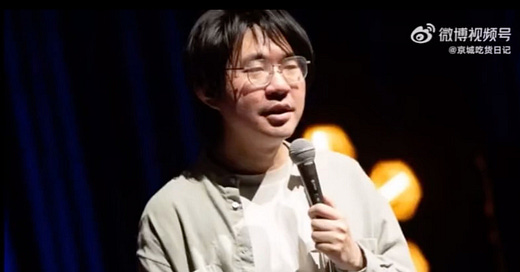PLA Can't Take a Joke + Beijing’s Last LGBT NGO Shuts Down
Wild Dogs, the PLA, Chinese Stand-Up, and the end for LGBT NGOs
Wild Dogs, the PLA, and Chinese Stand-Up
At a Beijing live show on May 13, comedian “House” Li Haoshi 李昊石 told the following joke:
I adopted two stray dogs after moving to Shanghai. Strictly speaking, they weren’t even strays; they were literal wild dogs we picked up from a hill near our home. We really didn’t save them, since their positions within the hill’s food chain were pretty secure. It was more a transformation. We’re allowing them to experience city life.
These two dogs were truly at the top of the hill’s food chain. When I first saw them, it didn’t feel like I was looking at two dogs. It felt more like watching a nature documentary. They chased after a squirrel like a cannonball.
Usually, when you see a dog, you’d think it’s cute and feel as though your heart is about to melt, or something like that. When I saw those two dogs, only one single phrase flashed through my brain: “Fighting to win and forging exemplary conduct.”
The punchline at the end was the problem. It comes from “following the Party, fighting to win, and forging exemplary conduct” 听党指挥、能打胜仗、作风优良 — Xi Jinping’s officially articulated goal for the People’s Liberation Army, first announced in 2013. A Chinese audience would be familiar with the phrase from state media, and thus find it funny in this unexpected context. If you really read into it, you could maybe interpret the line as poking fun at the vacuous repetitiveness of such political phrases in Chinese society.
Some viewers, however, weren’t amused. Nationalistic netizens argued on social media that the joke inappropriately insults the army and compares soldiers to dogs. Jun Zhengping Comments 钧正平评论, a social media content channel operated by the PLA, commented:
Lowbrow humor, unrestrained indulgence, eye-catching entertainment, insatiable desires — all these are completely detrimental and not at all beneficial to arts and culture!
XiaoGuo Comedy 笑果文化, House Li’s management company, announced in an apology letter on May 15 that the comedian is indefinitely suspended from all performances, and reiterated their commitment to “put an end to content that does not conform to Core Socialist Values.” Beijing’s municipal Culture Industry Administration Law Enforcement Team (文化市场行政执法总队) confirmed on the same day that they will investigate the company. The following day, they were hit with a $2m fine and had future performances suspended.
XiaoGuo, founded by longtime star Li Dan 李诞, is one of the key companies that professionalized stand-up in China and brought it into mainstream entertainment. It sometimes collaborates with state media outlets, including co-producing with the People’s Daily a recent documentary series about China’s stand-up scene. The fact that an industry giant may fall from grace over a rather minor joke is sending chills throughout the Chinese comedy world in an already turbulent year: as we covered back in February, comedian Chizi 池子 (formerly of XiaoGuo) was erased from the web after telling apparently “asylum-claim worthy” jokes on his North American tour.
It’s also interesting to note the dynamics of censorship happening here. As with many other “insulting China” incidents, this one began with social media gripe. The noise on Weibo arguably forced censors’ hands: had they simply looked the other way, they might have appeared soft.
For more about how online censorship in China can be “participatory” and “collective” — that is, with active involvement of average netizens — this paper in which Zhifan Luo and Muyang Li investigate the danmei (male homoerotic content) community is great.
Another NGO Bites the Dust
Beijing LGBT Center — China’s most prominent (and one of the last) organizations for gender and sexual minorities — announced on May 15 that it is shutting down after fifteen years due to “forces beyond [their] control.” Space for activism has been shrinking for a long time, but it’s still hard to overstate how big of a loss this is.
In addition to advocacy, Beijing LGBT Center conducted some excellent research. If you’ve ever seen a statistic about Chinese LGBTQ people cited in Western media, there’s a good chance it came from their work. Some of their reports:
“Being LGBTQI in China,” a 2016 national survey on social attitudes, in collaboration with the UN and Peking University (English);
2017 survey on transgender and gender non-conforming Chinese, also with PKU (English);
2021 report on mental health among gender and sexual minorities, in collaboration with the Chinese Academy of Sciences (in Chinese).
Bloomberg’s story on the closure is here. The Center’s defiant closing statement:
History will never forget your effort and involvement. It is precisely because of diversity that this world is such a wondrous place.
May citizens of China enjoy equal rights in every realm, regardless of gender, sexuality, expression, or identity.



